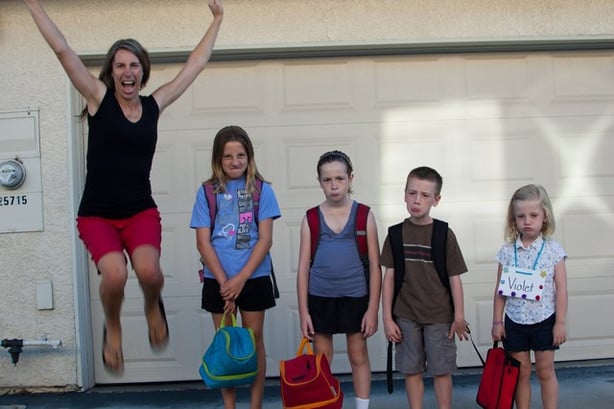I really don’t.
Don’t get me wrong, I think my kids are very, very cute. Certainly their unique personalities and funny little quirks make them all the more endearing to me, rendering them cuter, perhaps, in my eyes than in other people’s. However, I also have some objective grasp on reality which allows me to say no, my children are not cuter than the billions of other children on this planet.
But every time I admit this to someone, particularly to another young mother, I get looked at askance, as if by not insisting that, “yes, my children are cuter than yours,” somehow I’m not loving them enough.
It is very bizarre that in our world one of the hallmarks of a doting mother is an insistence that her children are cuter than any other child who has ever lived. Every time a mother proclaims that (and it happens all the time), I get really uncomfortable. Particularly because the proclamation is usually followed by an expectant look and a pause, as if the mother expects whoever hearing the proclamation to jump in with, “Why yes, you have been gifted with offspring cuter than any offspring this world has every seen, including mine!” Usually I just give a vague smile and a “mmmhmmm,” while what I really want to say is, “Actually I think this baby is the cutest baby in the world. Certainly a lot cuter than your kids.”
Okay, so I would never really say that to someone. But I would like to ask all the mothers out there: why do we insist on saying this? Maybe I’m just around the wrong types of people, but I hear it all the time. On facebook, in daily conversation, at the park, at mother’s groups, in church…it seems to be some latent vanity that comes rearing to the surface whenever we become mothers. It’s almost as if we think that because we’re not saying it about ourselves it’s okay to go ahead and be as vain as we please.
There are a lot of problems with this. The first one is that it is vanity, plain and simple. The second one is that it’s self-congratulatory, asinine, and makes whoever is listening (or reading) feel uncomfortable and awkward. The third one is, to my mind, the most problematic. What happens to your child when they leave the shelters of childhood and your arms and strike out into the wide world only to find out that they are not, in fact, the cutest child that ever lived?
There was a study done recently that found that self-esteem rates among teenagers and young adults are the highest they have ever been, despite the fact that measurable achievements by this age group are the lowest they have been in decades. (I’ve been searching but cannot find the study; if anyone knows where it is, please leave it in the comment box. Thanks!) Much of this is due to our society’s bizarre push to improve self-esteem among children, or to improve children’s “emotional intelligence.” This, in itself, is damaging and self-defeating; by insisting that children have high self-esteem in the absence of reasons for it, you are basically ensuring that these children will never feel the drive to succeed. Instead, they will simply go through life feeling “successful.”
But how much of this can be traced back to us, their mothers? Granted, I’m much closer in age to the group polled in this study than the group that raised them, but I think the same pattern emerges. We tell our children that they are “the cutest in the world” and then inevitably, one day, they will realize that they aren’t. What happens then? Either they go into denial and continue believing that in fact, they are more attractive than everyone else, or they become depressed and sometimes resort to desperate measures to make themselves more attractive. Anorexia, bulimia, plastic surgery…how much of these dangerous body-altering behaviors can be traced to unrealistic beliefs about oneself, instilled in childhood? The same is true of other oft-repeated parenting lines.
For example, “you can be anything you want to be.” This is a patent lie. I understand the sentiment behind it, and it’s a noble one. We don’t want to dampen our childrens’ dreams, and we want them to know that if they work hard, they can achieve many things. But the truth is, my little Charlotte, in the 11th percentile for height, will never be in the WNBA. If she expressed a dream to to so, I would never tell her that it’s impossible. Instead, I would tell her to work hard and practice her skills, but that she is already disadvantaged because of her height. And I would, eventually, tell her the simple truth: sometimes physical limitations make it impossible to achieve your dreams. Before you all freak out and point me to this video, let’s be honest: that is a unique achievement that depended only on the man’s determination and a good set of prosthetic limbs. In the world, a child will constantly face scrutiny, judgment, comparison, and rejection, and I believe that the best way to prepare them to deal with these harsh realities is to be honest yourself, in a more gentle fashion. As our children grow, I plan to concentrate their focus on their talents and strengths, while helping them to see their weaknesses and work to improve them. But I will never give them false hope or a false sense of themselves. I believe that telling a child they can do anything gives them a sense of achievement that they haven’t actually earned. They subconsciously think, “I can do anything! Why should I work so hard when I can already do anything?”
Think about the people who have achieved great things: many of them did so simply because they were told they couldn’t. If you don’t believe me, watch “Men of Honor” (actually, watch that anyway) or read about Annie Sullivan. The truth is, self-esteem and self-confidence don’t actually help a child when they come up against a roadblock; what does help is determination and a strong work ethic, both of which are more necessary and less apparent in this day and age than ever before.
So maybe we, as mothers, should take the initiative. Maybe, just maybe, we started this whole mess with a phrase as seemingly innocent as “I have the cutest children in the world!” And maybe, just maybe, we can end it by striking that phrase out of our vocabulary and telling our kids the simple, honest truth: someone out there will always be cuter, more talented, taller, faster. But talent, looks and physical ability can easily crumble when set up against pure, old-fashioned determination.











